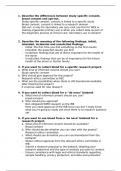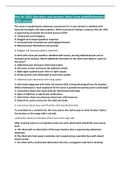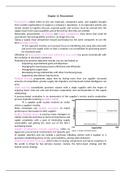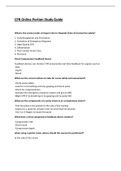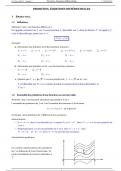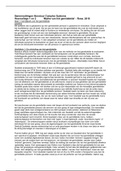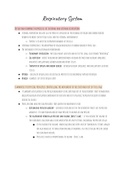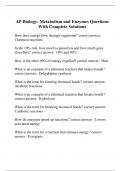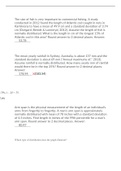1. Describe the differences between study specific consent,
broad consent and opt-out.
Study specific consent: consent is linked to a specific study
Broad consent: consent is linked to a research domain
Opt-out: is only for secondary use (you cant use this for WES or
making organoids) primary use is when you collect data as part of
the diagnostic process of clinical care. Secondary use is research
2. Describe the meaning of the following findings: initial,
intended, incidental and unsolicited findings.
- Initial: the first time you find something so the first results
- Intended: the expected results you find
- Incidental: findings that are of direct important for the health of
the donor
- Unsolicited: findings that can be of importance for the future
health of the donor or his/her family
3. If you want to collect blood for a specific research project.
a. What kind of informed consent should you use?
Study specific consent
b. Who should give approval for this project?
Research ethics committee so REC
c. What are the possibilities when there is still biomaterial available
after finishing the project?
It could be used for new research
4. If you want to collect blood for a “de novo” biobank
a. What kind of informed consent should you use?
broad consent
b. Who should give approval?
Non-obligated WMO research so the IRB
Here you need approval of the IRB since you don’t really know
what you’re going to study yet since there is no research question
yet
5. If you want to use blood from a ‘de novo’ biobank for a
research project.
a. What kind of informed consent should be available?
Broad consent
b. Who should decide whether you can start with the project?
Research ethics committee
c. What should you do before you can use biomaterial from the
biobank?
- Obtain ethical approval from the relevant ethics committee or
IRB.
- Submit a research proposal to the biobank, detailing your
research objectives and the type of analysis you plan to conduct.
- Ensure compliance with legal and ethical standards regarding
sample handling, privacy protection, and data anonymization
broad consent and opt-out.
Study specific consent: consent is linked to a specific study
Broad consent: consent is linked to a research domain
Opt-out: is only for secondary use (you cant use this for WES or
making organoids) primary use is when you collect data as part of
the diagnostic process of clinical care. Secondary use is research
2. Describe the meaning of the following findings: initial,
intended, incidental and unsolicited findings.
- Initial: the first time you find something so the first results
- Intended: the expected results you find
- Incidental: findings that are of direct important for the health of
the donor
- Unsolicited: findings that can be of importance for the future
health of the donor or his/her family
3. If you want to collect blood for a specific research project.
a. What kind of informed consent should you use?
Study specific consent
b. Who should give approval for this project?
Research ethics committee so REC
c. What are the possibilities when there is still biomaterial available
after finishing the project?
It could be used for new research
4. If you want to collect blood for a “de novo” biobank
a. What kind of informed consent should you use?
broad consent
b. Who should give approval?
Non-obligated WMO research so the IRB
Here you need approval of the IRB since you don’t really know
what you’re going to study yet since there is no research question
yet
5. If you want to use blood from a ‘de novo’ biobank for a
research project.
a. What kind of informed consent should be available?
Broad consent
b. Who should decide whether you can start with the project?
Research ethics committee
c. What should you do before you can use biomaterial from the
biobank?
- Obtain ethical approval from the relevant ethics committee or
IRB.
- Submit a research proposal to the biobank, detailing your
research objectives and the type of analysis you plan to conduct.
- Ensure compliance with legal and ethical standards regarding
sample handling, privacy protection, and data anonymization

